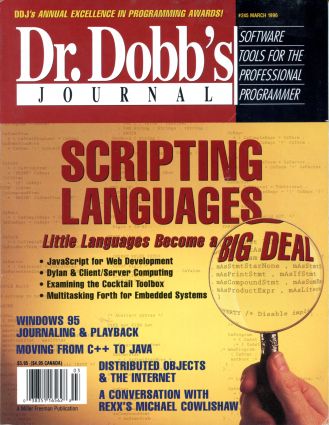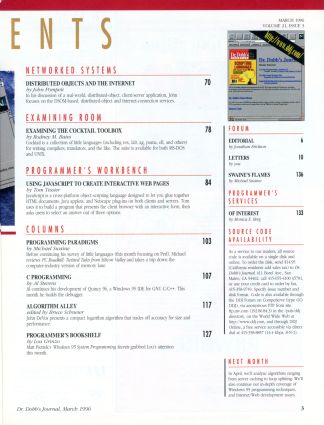
p.6 EDITORIAL
[author : Jonathan Erickson] #Edito
TABLE OF CONTENTS
FEATURES
p.16 DR. DOBB'S JOURNAL EXCELLENCE IN PROGRAMMING AWARDS
[author : Jonathan Erickson]
Larry Wall, author of Perl, and James Gosling, chief architect of Java, are recipients of our annual award that honors achievement in the world of software development.
p.18 DYLAN'S CREOLE INTERFACE
[author : Edward Cessna]
The Dylan programming environment includes Creole, a foreign-function interface that allows Dylan programs to call routines written in other languages—and routines in other languages to call Dylan routines. Edward uses Creole to interface Dylan with the Sybase database library.
p.30 BUILDING PARSERS WITH LEOPURD
[author : Thor Mirchandani]
Leopurd is a program that generates a maintainable table-free parser from an input grammar. In building legible, maintainable systems, Leopurd uses the best features from both top-down and bottom-up parser technology.
p.36 A CONVERSATION WITH MICHAEL COWLISHAW
[author : Jack Woehr]
Over the years, IBM Fellow Michael Cowlishaw has been a staff member in virtually every IBM major research center. Still, Michael is best known for developing the Rexx programming language. Jack chats with him about Rexx and a number of other topics.
p.46 WINDOWS 95 JOURNALING AND PLAYBACK
[author : Mark Russinovich and Bryce Cogswell]
To demonstrate the power and flexibility of the Windows 95 journaling and playback facility, Mark and Bryce present a macro recorder program that provides keyboard and mouse macros that can be used anywhere and anytime. This macro involves the use of multithreading and having virtual devices notify a Win32 program of an asynchronous event.
p.52 MOVING FROM C++ TO JAVA
[author : Gary Aitken]
Certain aspects of Java are easier to learn than C++. As Gary points out, however, what's really important to efficient Java programming is a good understanding of object-oriented concepts.
p.98 USING OODCE
[author : Jonathan Roberts and Dan Zigmond]
Our authors use OODCE, a C++ library originally developed by Hewlett-Packard, to develop a distributed application.
EMBEDDED SYSTEMS
p.58 A TINY PREEMPTIVE MULTITASKING FORTH
[author : Andy Yuen]
Andy describes how you can provide support for preemptive multitasking, semaphores (for task synchronization), and Forth interrupt-service routines for the 16-bit 8086 eForth—with only 1K of additional code.
NETWORKED SYSTEMS
p.70 DISTRIBUTED OBJECTS AND THE INTERNET
[author : John Pompeii]
In his discussion of a real-world, distributed-object, client/server application, John focuses on the DSOM-based, distributed-object and Internet-connection services.
EXAMINING ROOM
p.78 EXAMINING THE COCKTAIL TOOLBOX
[author : Rodney M. Bates]
Cocktail is a collection of little languages (including rex, lalr, ag, puma, ell, and others) for writing compilers, translators, and the like. The suite is available for both MS-DOS and UNIX.
PROGRAMMER'S WORKBENCH
p.84 USING JAVASCRIPT TO CREATE INTERACTIVE WEB PAGES
[author : Tom Tessier]
JavaScript is a cross-platform object scripting language designed to let you glue together HTML documents, Java applets, and Netscape plug-ins on both clients and servers. Tom uses it to build a program that presents the client browser with an interactive form, then asks users to select an answer out of three options.
COLUMNS
p.103 PROGRAMMING PARADIGMS
[author : Michael Swaine]
Before continuing his survey of little languages (this month focusing on Perl), Michael reviews PC Roadkill: Twisted Tales from Silicon Valley and takes a trip down the computer-industry version of memory lane.
p.107 C PROGRAMMING
[author : Al Stevens]
Al continues his development of Quincy 96, a Windows 95 IDE for GNU C/C++. This month he builds the debugger.
p.117 ALGORITHM ALLEY
[author : Bruce Schneier]
John DeVos presents a compact logarithm algorithm that trades off accuracy for size and performance.
p.127 PROGRAMMER'S BOOKSHELF
[author : Lou Grinzo]
Matt Pietrek's Windows 95 System Programming Secrets grabbed Lou's attention this month.
FORUM
p.10 LETTERS
[author : you]
p.136 SWAINE'S FLAMES
[author : Michael Swaine]
PROGRAMMER'S SERVICES
p.133 OF INTEREST
[author : Monica E. Berg]

